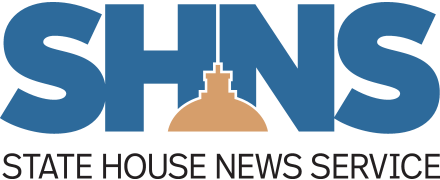Every weekday, Gail Harris knocks on doors throughout Boston with a team of fellow canvassers, who remind people how they can maintain their health insurance coverage during the state’s massive effort to gauge eligibility for millions of MassHealth members.
Harris, a canvassing supervisor from Boston who works with the advocacy organization Health Care For All, said teams have repeatedly returned to neighborhoods since April. They work through a list of addresses they have been instructed to visit, strive to contact residents and drop off leaflets about the redetermination process. There are two shifts daily, one from 10 a.m. to 4 p.m. and another from 2-8 p.m.
Occasionally, Harris said, she knocks on the door of someone she knows.
“You name it, we’ve been anywhere from South Boston, Mattapan, Roxbury, South End, Jamaica Plain, Hyde Park — so we’re covering every possible area within the Boston community,” Harris told the News Service. “What we find is no one turns you away, because what we do tell them is, this may not be something you need, but maybe there’s a family member, or a friend, or a loved one that you do know that can benefit from this information, and we just hope that you share it. And we get a lot of positive feedback.”
Harris was among the canvassers and volunteers celebrated by state health and elected officials — including Rep. John Lawn and Sen. Cindy Friedman, co-chairs of the Joint Committee on Health Care Financing — at a press conference Monday as the year-long eligibility redetermination process stretches into its eight month.
About 76,000 people have been removed from MassHealth since March amid the effort to reassess the eligibility for 2.4 million members, Assistant Secretary for MassHealth Mike Levine said Monday. It’s the same figure that officials offered on Oct. 20, and Levine said the next update will be available in mid- to late-November.
MassHealth rolls are expected to drop by a net 300,000 to 400,000 members, the Healey administration has said. The redetermination process is expected to save the state $1.9 billion in fiscal year 2024.
Levine reiterated the scale of MassHealth disenrollments are expected to grow this fall and winter, with that timing coinciding with open enrollment for the Massachusetts Health Connector, the state’s health insurance marketplace. The next few months will be “critical,” Levine said, as he vowed MassHealth’s approach to connecting with members will not default to the pre-pandemic status quo.
“If you’re one of our members, we’re not just going to send you a letter in the mail and say, you know, ‘wish you the best.’ We are going to be calling, texting, emailing in the language that you speak, are going to be partnering with community-based organizations who live in your community and know you and can help you,” Levine said.
He added, “This is not just about the next year — it’s about the years to come and ensuring that people can access and stay on MassHealth.”
Health care access activists say they’ve reached more than 167,000 people with information about insurance options as the state examines its public insurance rolls with an eye toward closing MassHealth coverage for people who are no longer eligible.
Health Care For All, alongside 30 community and faith organizations, has held nearly 1,400 outreach events and activities, said executive director Amy Rosenthal. A multilingual, multicultural awareness campaign has targeted 15 municipalities with big volumes of MassHealth members. Canvassing teams have knocked on over 421,000 doors — translating into more than 115,000 conversations — as of Friday, Rosenthal said.
In Boston, canvassers have knocked on more than 48,600 doors since April, said Martine Chanel, field director for the city’s canvassing team.
“I’ve knocked on doors where families have received the blue envelopes for MassHealth, and they were grateful that we were there to remind them of the importance of taking action to maintain their coverage,” Chanel said. “Health care is not just about numbers and statistics — it’s about real, every day experiences of the people we serve. It’s about ensuring that individuals and families, regardless of their background, have access to the health care and insurance they need.”
Maciel Beato, a Boston canvasser, said she’s helped encouraged people who are wary of dealing with MassHealth to take information she’s distributing and learn about the importance of insurance coverage. Most residents seem willing to take information because they know it’s useful, even if they’re currently under their parents’ insurance, Beato said.
“A lot of people don’t know,” about the MassHealth redetermination process, she said. “So when we are able to help them and they get excited like, ‘Oh thank you, I forgot I needed to update,’ that is great. I love being able to help,” Beato said.
Friedman said MassHealth’s redetermination process would not be successful without canvassers, as she also thanked representatives from MassHealth, the Massachusetts Health Connector and advocacy groups gathered Monday morning.
“We learned a lesson from COVID: Funnily enough, if someone knocks on your door, and they look like you, and they talk like you, and they give you information, by golly, you trust them,” Friedman said. “When somebody, from somewhere, someplace else or talking voice tells you something, you’re not so ready to trust them — and that is why without you during COVID, and now with you during redetermination, we could not do this. We cannot underestimate the value that you all, that these community partners are bringing, we absolutely cannot do without you.”

